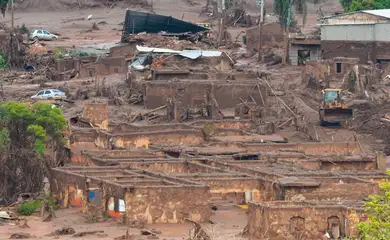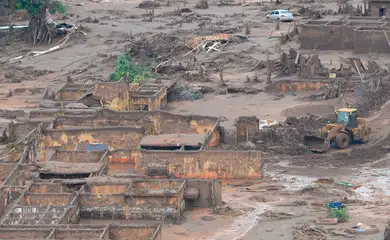Mariana tragedy trial begins in the UK

A British court will decide whether Anglo-Australian mining company BHP Billiton is responsible for the dam collapse tragedy in Mariana, Minas Gerais state, in 2015. The trial will begin Monday (Oct. 21) and is expected to last until March 5 next year. The dam belonged to Samarco, a joint venture between BHP Brasil and Vale.

In the incident, an avalanche of ore tailings reached the Doce river basin, impacting dozens of municipalities in the states of Minas Gerais and Espírito Santo. Nineteen people died.
Law firm Pogust Goodhead (PG) is representing 620 thousand people, 46 municipalities, and 1,500 companies affected by the collapse before the Technology and Construction Court in London.
The firm argues that BHP Billiton should be held accountable, since it was Samarco’s controlling shareholder and therefore responsible for its business decisions, as well as being the beneficiary and financier of the mining activity that caused the disaster.
PG’s team believes that BHP Billiton is liable for the collapse both objectively and subjectively, by voluntary action or omission, and that it should answer for the damage caused in its capacity as controlling shareholder.
PG also claims BHP was aware of the risks facing the dam collapse due to factors such as the attendance of company executives at Samarco board and committee meetings, the approval and financing of relevant projects by its subsidiary in Brazil, and constant audits of the joint venture.
In addition, the law firm argues, statements made by BHP executives after the disaster show that the company had identified the risk in Mariana before the incident and had even received a technical report pointing to a possible dam failure.
Legal basis
The trial will be legally based on Brazilian law, supported by Brazilian environmental and civil legislation, despite the fact that the case is being heard in a British court.
“Even though the procedural laws are English laws, the substantive law—on liability and damage quantification—is Brazilian. This is interesting as it provides an exercise in the sovereignty of Brazilian law. The law must be obeyed by anyone, even by multinationals operating in Brazil and passing on their profits outside of Brazil,” the firm’s spokesperson, Ana Carolina Salomão, stated.
According to PG’s legal director, Caroline Narvaez, the trial hearings begin with opening statements from both sides’ lawyers, but the judge in charge, Finola O’Farrell, is already reading the documents submitted by both sides.
This first phase of the hearings should last four days. In the following three weeks, BHP’s witnesses will be heard, when both the company and the law firm will be allowed to ask questions about issues such as the level of control BHP had over the dam, safety measures, and its conduct after the collapse.
The next step will be for experts in environmental, corporate, and civil liability law invited by both BHP and PG to explain to the British judge how Brazilian law operates.
“The judge is used to dealing with international cases, in which English procedure applies, but she doesn’t know and shouldn’t know Brazilian law. The role of these Brazilian experts is to explain how the law works in Brazil, how the rules of civil, environmental, and corporate liability apply in Brazil,” Narvaez noted.
After an end-of-year break, the hearings will resume for four days in January, with the hearing of experts in the field of geotechnics, who will be able to expound on technical details relating to the incident.
The hearings will end with spoken arguments from the lawyers for the plaintiffs and BHP, which should take place from February 24 to March 5. The judge is expected to take up to three months to announce her decision.
At this stage, there no compensation has been settled on. Values should only be defined later if BHP is held responsible—but PG’s team estimates that the amounts to be paid to the victims of the collapse may add up to BRL 230 billion.
Duplication
In a statement, BHP says that the UK lawsuit duplicates and undermines ongoing efforts in Brazil.
“BHP refutes the allegations about the level of control held by Samarco, which has always been a company with independent operation and management. We continue to work closely with Samarco and Vale to support the ongoing reparation and compensation process underway in Brazil.”
The text also mentions the Renova Foundation, created in 2016 as part of the first agreement with the Brazilian public authorities, through which, BHP declared, over BRL 37 billion has been allocated in emergency financial aid, compensation, environmental repair, and infrastructure for approximately 430 thousand people, local businesses, and indigenous and quilombola communities.
The mining company classifies the collapse of Samarco’s Fundão dam as “a tragedy” and said that its “deep solidarity remains with the families and communities affected.”



Dê sua opinião sobre a qualidade do conteúdo que você acessou.
Escolha sua manifestação em apenas um clique.
Você será direcionado(a) para o sistema Fala.BR, mas é com a EBC que estará dialogando. O Fala.BR é uma plataforma de comunicação da sociedade com a administração pública, por meio das Ouvidorias.
Sua opinião ajuda a EBC a melhorar os serviços e conteúdos ofertados ao cidadão. Por isso, não se esqueça de incluir na sua mensagem o link do conteúdo alvo de sua manifestação.
Clique aqui para mais informações sobre a Ouvidoria da EBC.










